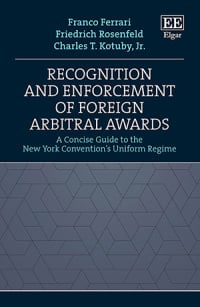Paperback
Recognition and Enforcement of Foreign Arbitral Awards
A Concise Guide to the New York Convention''s Uniform Regime
9781035322145 Edward Elgar Publishing
This incisive book is an indispensable guide to the New York Convention''s uniform regime on recognition and enforcement of foreign arbitral awards. Framing the Convention as a uniform law instrument, the book analyses case law from major arbitration jurisdictions to explain its scope of application, the duty to recognize arbitral agreements and awards as well as their limitations, and the procedure and formal requirements for enforcing arbitral awards.
More Information
Critical Acclaim
Contents
More Information
This incisive book is an indispensable guide to the New York Convention''s uniform regime on recognition and enforcement of foreign arbitral awards. Framing the Convention as a uniform law instrument, the book analyses case law from major arbitration jurisdictions to explain its scope of application, the duty to recognize arbitral agreements and awards as well as their limitations, and the procedure and formal requirements for enforcing arbitral awards.
Combining insight from arbitration practice with perspectives from private international law, the book underlines the importance of the Convention’s foundation in a treaty of international law, arguing that this entails a requirement to interpret the key concepts it sets forth based on international law rules of interpretation. However, it also demonstrates where municipal laws are relevant and discusses the private international law principles through which these instances can be identified.
Addressing one of the core treaties of international arbitration, this will be crucial reading for legal practitioners and judges working in the field. It will also prove valuable to scholars and students of commercial and private international law, particularly those focused on cross-border disputes and arbitration.
Combining insight from arbitration practice with perspectives from private international law, the book underlines the importance of the Convention’s foundation in a treaty of international law, arguing that this entails a requirement to interpret the key concepts it sets forth based on international law rules of interpretation. However, it also demonstrates where municipal laws are relevant and discusses the private international law principles through which these instances can be identified.
Addressing one of the core treaties of international arbitration, this will be crucial reading for legal practitioners and judges working in the field. It will also prove valuable to scholars and students of commercial and private international law, particularly those focused on cross-border disputes and arbitration.
Critical Acclaim
‘The book contains 10 chapters across 170 pages, wherein Ferrari et al. do an excellent job of introducing the uninitiated to “internationalist” perspectives of the recognition and enforcement of foreign arbitral awards, greatly simplifying the topic to ensure the reader’s comprehension. However, experts in this area of law will equally enjoy the extensive comparative jurisprudence that is drawn upon in the book. Besides, it makes for a very interesting read: I finished it in just two days!’
– Chukwuma Okoli, Conflictoflaws.net blog
‘Quintessence is the queen of a land of speculative science in Rabelais’ Gargantua. The New York Convention is our quintessence in the art that we call international arbitration. We can be grateful that we are able to practice our trade with the benefit of the insights of those who scrutinize our field around the world. Guidance on the New York Convention should be as practical and intellectually stimulating as this book.’
– Julie Bédard, Skadden, Arps, Slate, Meagher & Flom LLP, US and Brazil
– Chukwuma Okoli, Conflictoflaws.net blog
‘Quintessence is the queen of a land of speculative science in Rabelais’ Gargantua. The New York Convention is our quintessence in the art that we call international arbitration. We can be grateful that we are able to practice our trade with the benefit of the insights of those who scrutinize our field around the world. Guidance on the New York Convention should be as practical and intellectually stimulating as this book.’
– Julie Bédard, Skadden, Arps, Slate, Meagher & Flom LLP, US and Brazil
Contents
Contents: 1. The New York Convention as an instrument of uniform law 2. Scope of application 3. The recognition and enforcement of arbitration agreements 4. The duty to recognize and enforce arbitral awards and its limitations 5. Grounds for refusal related to jurisdiction 6. Grounds for refusal related to proper notice and the ability to present one’s case 7. Grounds for refusal related to procedure 8. Grounds for refusal related to the award’s status under the law applicable to it 9. Grounds for refusal related to public policy 10. The procedure and formal requirements for recognition and enforcement Index




